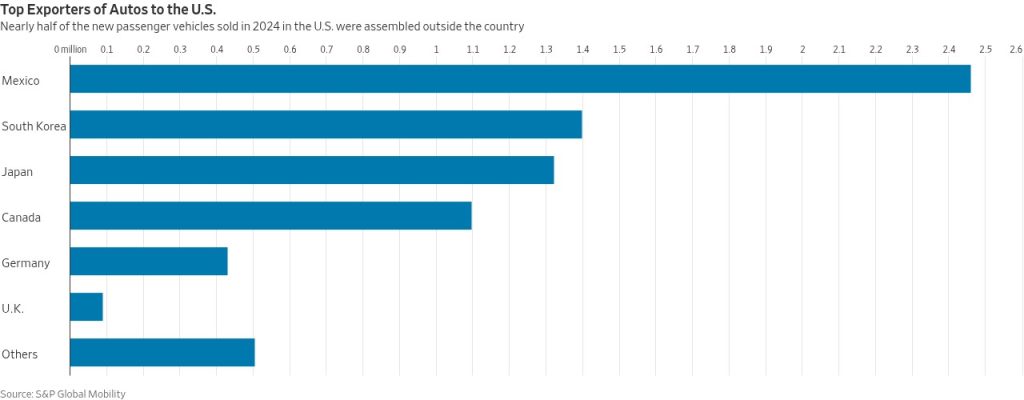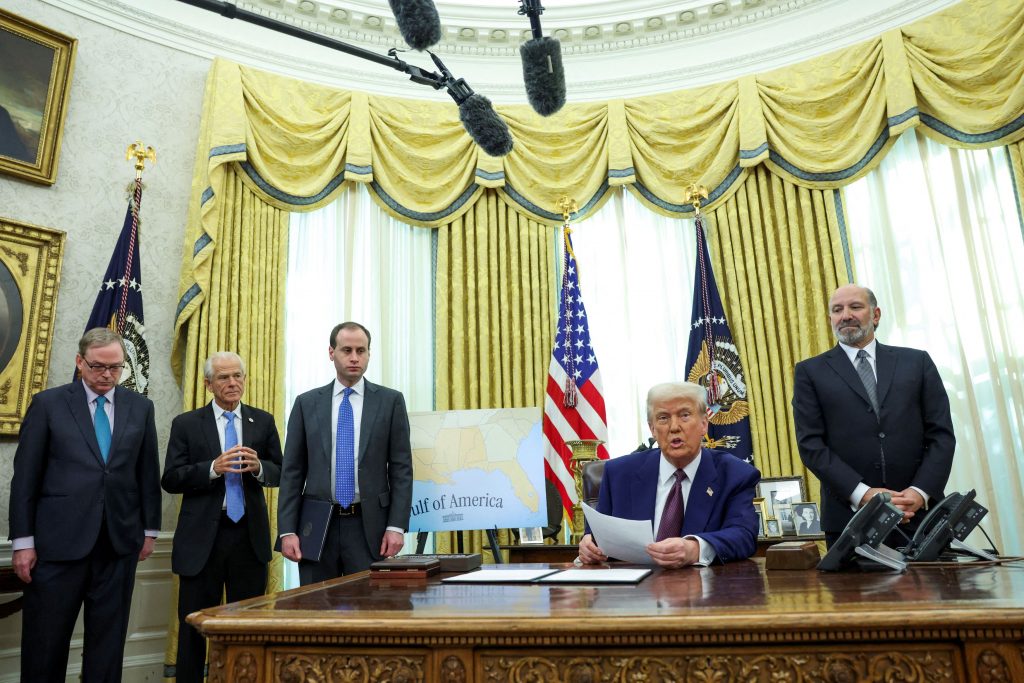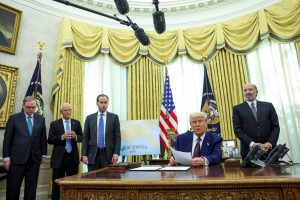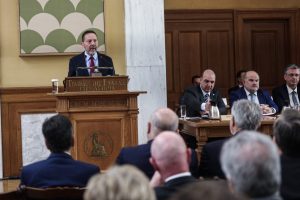President Trump said he would impose 25% tariffs on global automotive imports to the U.S., making good on pledges to penalize foreign makers of cars and trucks.
“What we’re going to be doing is a 25% tariff on all cars not made in the U.S.,” Trump said Wednesday in the Oval Office, appearing to dispel any chance of an exemption for countries such as Canada and Mexico, which have a free-trade agreement with the U.S.
The U.S. will start collecting the auto tariffs on April 3, Trump said, the day after he is set to announce a broader slate of trade actions. Trump’s so-called reciprocal tariffs, slated for that day, were originally planned to equalize U.S. tariffs with those charged by foreign nations, but Trump said Wednesday that the tariffs he plans to implement would likely be lower than that.
The tariffs will cover finished automobiles and automotive parts, a senior administration official said. The administration had considered exempting auto parts from the tariffs. But parts that are compliant with the U.S.-Mexico-Canada Agreement will remain tariff-free until the Commerce Department “establishes a process to apply tariffs to their non-U.S. content,” White House deputy press secretary Harrison Fields wrote online.
The 25% tariff will be added on top of existing duties, including a 2.5% tariff currently imposed by the U.S., as well as existing 25% tariffs on light trucks, known as the chicken tax, the senior administration official said. They would be added on top of 25% tariffs on goods from Canada and Mexico that Trump imposed because he said those countries weren’t doing enough to disrupt the illicit fentanyl trade. Negotiations on those duties are continuing.
Canadian Prime Minister Mark Carney called the tariffs a direct attack on Canadian workers. He said Canadian officials would decide what actions to take, including possible retaliatory tariffs, after seeing the language of Trump’s executive order.

“It’s clear that this is a violation and he has betrayed our trade agreement,” said Carney, who has just begun an election campaign that will culminate in an April 28 vote.
Nearly half of new passenger vehicles sold in the U.S. in 2024 were assembled outside the U.S., according to data from S&P Global Mobility. Mexico is the biggest auto exporter to the U.S., sending pickups from General Motors , Ram and Toyota as well as affordable sedans from Nissan and luxury models from BMW and Volkswagen ’s Audi.
Popular mass-market vehicles such as Toyota’s RAV4 and Honda ’s Civic are also imported from Canada for sale in the U.S.
Autos Drive America, a trade group representing foreign automakers with U.S. operations, including Toyota, Volkswagen , Honda and Hyundai , said tariffs would make cars even less affordable after significant price increases since the onset of the pandemic.
The American Automotive Policy Council, a trade group representing Ford Motor , GM and Stellantis , said tariffs should be implemented without raising prices for consumers or hurting the competitiveness of North American automakers.
GM stock slid 8% after hours on Wednesday, while Ford declined 5% and Jeep and Ram parent company Stellantis fell 5%. Tesla , which builds its domestically sold electric vehicles in the U.S., gained about 1%.
Trump’s previously proposed tariffs of 25% on Canada and Mexico would add about $6,000 in costs to vehicles assembled in those countries, assuming parts were also included in the levies, Cox Automotive said.
“Bottom line: lower production, tighter supply and higher prices are around the corner,” Cox Automotive chief economist Jonathan Smoke said.
Trump’s team has whipsawed between a maximalist approach to tariffs and offering potential leniency for companies and trading partners. Trump originally said that he would impose sector-specific tariffs on industries such as semiconductors, lumber and pharmaceuticals on April 2. But he reiterated on Wednesday that those industry-specific tariffs wouldn’t happen on that date, though they could be announced later.
Trump said his reciprocal tariffs would be “less than the tariff [trading partners] have been charging us for decades.” Trump also said the reciprocal tariffs will target “all countries,” and not just the 15% of nations Treasury Secretary Scott Bessent had said could be made a priority in the April 2 action.
The president reiterated a campaign pledge to juice auto demand, saying that he was working with House Speaker Mike Johnson to pass a policy that would allow consumers to deduct car interest payments from their income taxes for American-made cars.
United Auto Workers President Shawn Fain called the tariffs “a major step in the right direction for auto workers and blue-collar communities across the country.” The UAW has said automotive-industry outsourcing to Mexico has decimated U.S. manufacturing jobs since the original free-trade agreement was signed in 1994.
The European Union said it deeply regrets Trump’s decision to levy tariffs on the bloc’s automotive exports.
“The EU will continue to seek negotiated solutions, while safeguarding its economic interests,” European Commission President Ursula von der Leyen said.
Write to Gavin Bade at gavin.bade@wsj.com and Christopher Otts at christopher.otts@wsj.com






